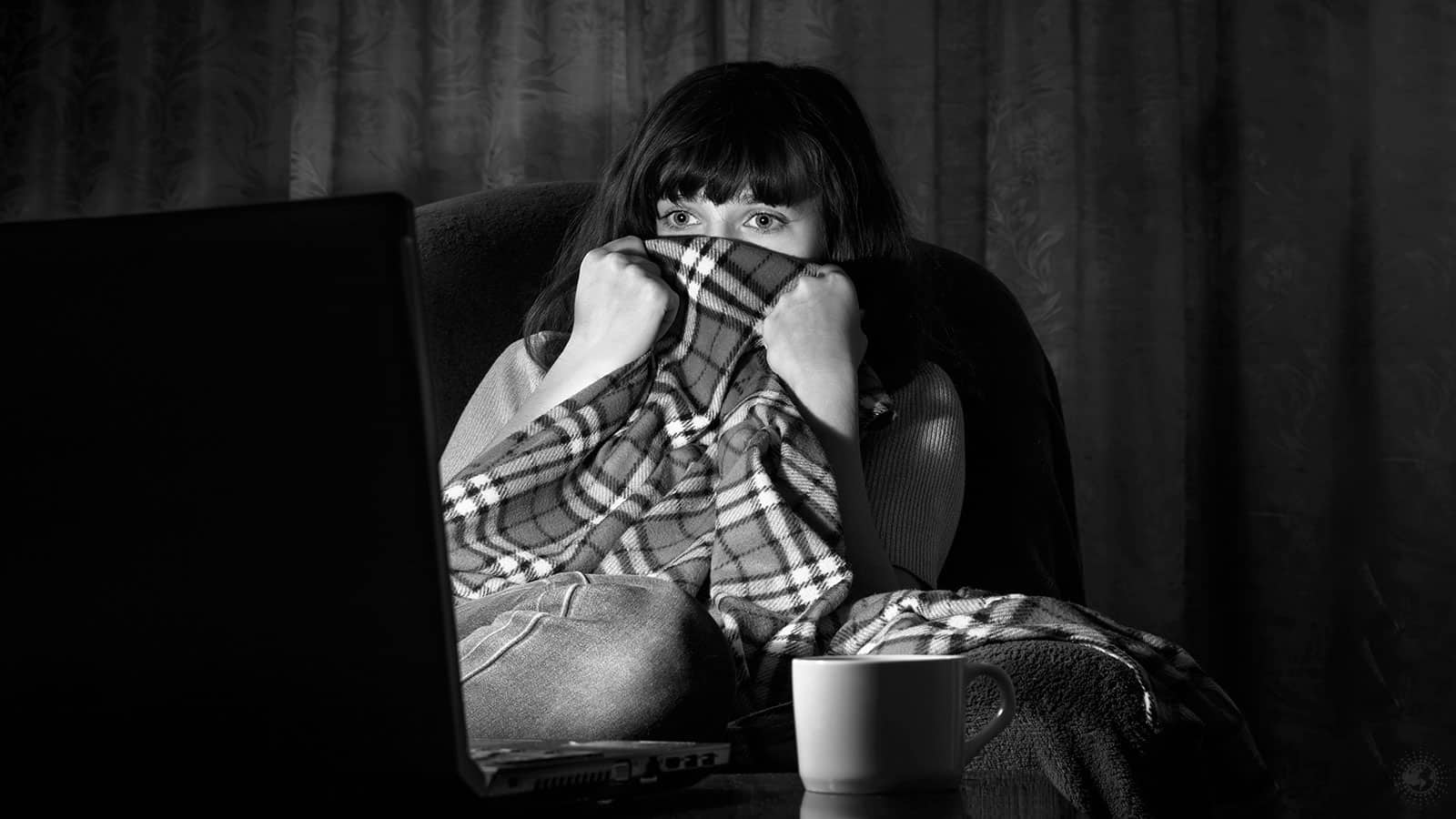Remember when you were at summer camp as a kid, and everyone asked each other if they were afraid of the dark? Fear of darkness is probably one of the main primordial concerns that are hardwired into our brain. Before early humans discovered fire, the night was a fearful place of danger lurking in every shadow.
Being afraid of the dark is a common fear in childhood. They are fearful of the make-believe monsters under the bed and things that go bump in the night. Fortunately, most people outgrow this fear and think nothing of sleeping in a darkened room.
For some people, being afraid of darkness carries on into adulthood. They may understand that there’s nothing to fear at night or when they enter a darkened room, yet they still have this irrational concern. When worry is irrational and starts to impede a person’s daily living, it becomes a phobia.
Phobia comes from the Greek word for fear. However, comparing fear to a phobia is like comparing a house cat to a lion. Mental health experts consider phobias an anxiety disorder. For the person with this extreme anxiety, the fear and threat are real, no matter how unfounded the reason.
What is Nyctophobia?
Nyctophobia, also known as lygophobia, is the irrational fear of darkness and dark places. While many adults may still be afraid of the dark, some people may have had their fear morph into a phobia. Nyctophobics experience extreme anxiety at night or in dark places.
They will actively avoid going into dark rooms and may carry a flashlight wherever they go. It’s usual for those with nyctophobia to sleep with the lights on and become anxious when the day turns to night. They often will not go to theaters or participate in anything to do with a darkened room.
What are the Signs & Symptoms of Nyctophobia?
Although this anxiety disorder may be one of the easiest to treat, some people may hesitate because it makes them look silly or weak, especially men. However, if nyctophobia is left untreated, it can wreak havoc on people’s lifestyles, work, and relationships. The signs and symptoms of this phobia are easy to recognize.
- Hyperventilation or feeling like you can’t breathe
- Dry mouth
- Heart palpitations or a rapid heartbeat
- Numbness in limbs or entire body
- Dizziness
- Heightened senses/awareness
- Tensed Muscles
- Nervous trembling
- Intense fear of impending danger or disaster
- Feeling out of control or thinking that you are dying
- Feeling trapped and can’t escape
If you’ve ever been diagnosed with a panic disorder, you will probably recognize many of these same symptoms of a panic attack. If you are nyctophobic, it is nighttime or a darkened room that triggers these symptoms. They can be severe enough to cause sleep deprivation and other mental disorders.
Talk to your primary healthcare provider if you notice any of these symptoms. Because these may mirror other ailments, you must be diagnosed by a professional to rule them out. The proper diagnosis can make it easier for your healthcare provider to formulate a treatment plan that’s best for you.
Four Typical Causes of Nyctophobia
One reason that this anxiety disorder can flourish is that it builds on primary childhood fears. Sometimes, certain medical conditions or trauma can exacerbate fear of the dark and turn it into a gripping phobia. Although each case may vary, these are some of the reasons some people develop into a nyctophobic.
1 – Learned Fear
As parents and guardians, you are a role model for your children. They learn at an early age to model your emotions by how you react to things. It’s not uncommon for a nyctophobic parent to pass on the phobia as a learned behavior.
Some studies suggest that phobias, in general, may run in families genetically. However, experts are quick to point out that environmental causes can also be the culprit. No one really knows where nurturing ends and nature begins when it comes to anxiety disorders.
2 – Childhood Abuse at Night
Even in the 21st century, childhood abuse and exploitation are alive and well. Nearly 3 million cases of child abuse and neglect are reported every year in the United States. Sadly, experts believe that many more cases go unreported, and as many as five children die from their abuse each day.
Physical, verbal, emotional, and sexual abuse are enough to give any child a lifetime of night terrors. Often, parents who are substance abusers become violent in the night because they are out of drugs or alcohol or are coming off a high. In the shadows of the night, when children should be sleeping warm and safe in their beds, sexual predators such as perverse relatives or deviant boyfriends often seek their victims.
If you’ve been a survivor of child abuse, you know that nighttime can trigger unspeakable memories that put your panic into overdrive. When the lights go out, you may relive each scene in a painful loop. Childhood trauma can be a tremendous factor in causing nyctophobic reactions.
3 – Childhood trauma
Some traumatic events in childhood have nothing to do with child abuse or neglect. These can happen in the most loving and nurturing homes. The death of a loved one is often painful for children to process, and it can often disrupt their sleeping patterns. Serious accidents and illnesses can also have a negative effect on children’s minds, and it causes them to react to darkness with fear.
If left untreated, it’s easy for this nocturnal fear to turn into a phobia. If you had a traumatic event in your life that disrupts your sleep and showers you with anxiety, consider talking to your mental health professional about nighttime phobias.
4 – Other Mental Illnesses
It’s also possible that other phobias and mental disorders can play into lygophobia. Those who have phobias of being alone or separation anxiety may develop a phobia of the dark. Since the symptoms of so many mental disorders overlap, it’s imperative to seek the counsel of an experienced mental health professional for a diagnosis.

Seven Common Treatments for Nyctophobia
You need to see someone who specializes in treating paranoia. While most mental health professionals train and certify to diagnose and treat mental conditions, many have areas of expertise. As your primary healthcare professional to refer you to a clinician who specializes in anxiety disorders like nyctophobia.
1 – Cognitive Behavioral Therapy, or CBT
The goal of CBT is to help you recognize thought patterns in your mind and ways of changing your attitude toward them. With a nighttime phobia, a CBT professional may help you discover how illogical your reactions are and ways to cope with them. CBT is an excellent way to treat this and other anxiety disorders.
2 – Exposure therapy/Desensitization therapy
When you are undergoing exposure and desensitization therapy, you learn to face your phobia head-on. It may be quite uncomfortable at first, but your therapist may expose you to a dark room to drive up your anxiety. Then, you will learn how to talk yourself through the anxiety and finally be less sensitive to the fear.
3 – Hypnotherapy
Hypnotherapy can be a useful tool for lygophobia, especially if past trauma is involved. A trained and certified hypnotherapist can use relaxation and regression techniques to find clues behind the causes of your phobia. Visualization and suggestions from the therapist may help ease your symptoms.
4 – Psychoanalysis
Frequently, it just helps to talk to someone neutral and non-judgmental about your phobia. Psychoanalysis may help you find patterns in your past that may have led up to your phobia of the dark. The more you understand how you think and how you react, the better equipped you are to make changes.
5 – Relaxation techniques
For thousands of years, Eastern mystics knew the value of calming the mind by relaxing your body. Many people find relief from their nighttime phobia with muscle relaxation, mindful breathing, and visualization. You may consider learning yoga poses and meditations that are specifically geared toward relieving tension and anxiety at night.
6 – Phobia Support Groups
There is often comfort in numbers and empathy. You may find hope and empowerment when you are involved with a support group for people with phobias. Listening to the ups and downs of their journey to recovery can be inspirational as you realize that you aren’t alone.
7 – Prescription Medication
In severe cases, a primary healthcare provider may prescribe medication for anxiety. Depending on your medical history and phobia severity, some providers may recommend sedatives to reduce your stress and allow you to sleep at night. You may also talk to your provider about alternative herbal supplements that ease anxiety.

Final Thoughts on Coping with Nyctophobia
Having a phobia of the dark has no bearing on your bravery or independence as an adult. Under the right circumstances, it can develop in anyone and cause them much grief if left untreated. If you have any of the risk factors or notice any of the signs and symptoms of nyctophobia, talk to your healthcare provider or mental health professional.
The post Psychology Explains the Causes of Nyctophobia (fear of the dark) appeared first on Power of Positivity: Positive Thinking & Attitude.
【Top 10 Malaysia & Singapore Most Beautiful Girls】Have you follow?
